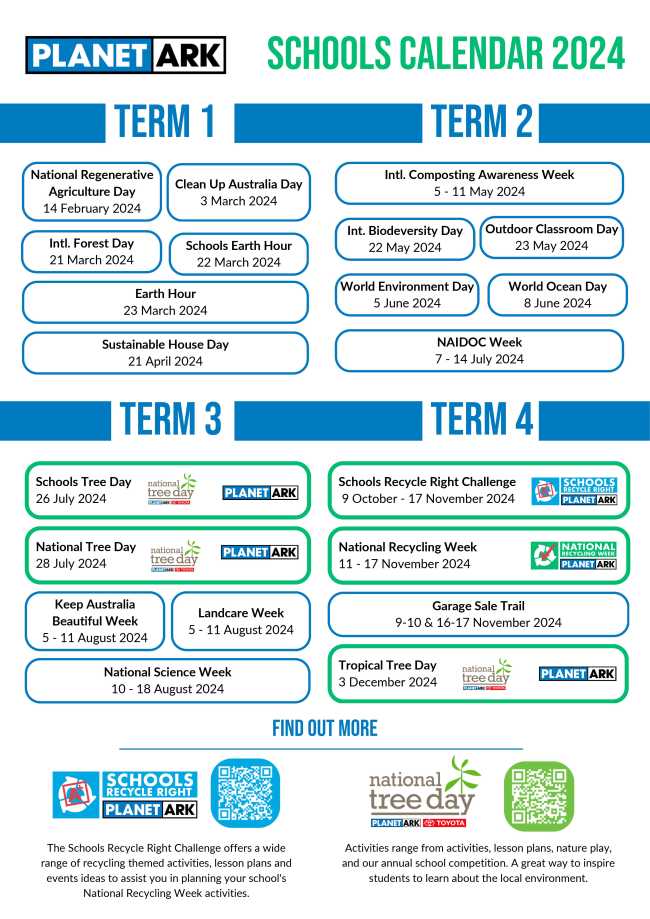Eco-friendly initiatives for a green school year
By Ashmeeta Subra 14 February 2024
Calling all teachers, parents and students looking to create positive environmental impact at your school! Here are Planet Ark’s top tips for sustainability at your place of learning in 2024.
The new school semester means more than just stocking up on fresh notebooks and stationery; it’s an opportunity to implement sustainable initiatives that can cultivate not only positive environmental impact, but also a sense of appreciation for the environment in students.
Check out our list of bright ideas to green up the school season and save the Planet Ark Schools Calendar for 2024 below!

1. Implement waste-free lunch days
Waste-free lunch days are a great way to get teachers, parents, and students involved in rethinking daily habits and taking responsibility for reducing waste.
To plan these designated waste-free lunch days, start by teaching students why it’s important to reduce waste and encourage them to bring reusable items, choose snacks with minimal packaging, and encourage local and sustainable buys. Designate spots around the school canteen for putting away food scraps to be composted instead of simply discarding them. For step-by-step instructions, check out our Waste-Free Lunch Guide from the Schools Recycle Right Challenge.
2. Participate in Schools Tree Day
Getting your hands dirty for Schools Tree Day (Friday, 26 July 2024) to teach students about the practical and environmental benefits of trees, get hands-on with nature and reap the physical, mental and emotional benefits that time in nature brings. Not to mention, you can spruce up your school grounds or create an ongoing learning tool like a bush-tucker garden!
To kickstart your school’s planting project, check out our Schools Tree Day resources. If your school needs funding to participate, you can apply for one of Planet Ark’s Seedling Bank grants as the next round of submissions close on Friday, 1 March 2024.
3. Establish schoolwide recycling points
Place bins for paper, plastic, and other recyclables around the school to encourage recycling in students’ daily routines. This invites them to learn about different materials and recycling processes, turning recycling stations into a valuable tool for environmental action within the school community. Download simple and effective signage from our Resources Hub to place on or above the bins so that students have instructions on what goes where. You can also educate students on the Australasian Recycling Label so that they know where to find recycling information on packaging outside school grounds.
Electronics are one of the fastest growing waste streams in Australia, despite containing many valuable materials. By setting up e-waste collection points, schools can ensure materials in electronic products are given new life – reducing overall waste and providing families a convenient drop-off point for their e-waste. Find out how your school can register to recycle used printer cartridges with Cartridges 4 Planet Ark, mobile phones with Mobile Muster, and used batteries with B-cycle. To learn about battery safety and disposal, check out our previous article.
4. Introduce eco-friendly event guidelines
School events often generate a lot of waste, including disposable utensils, decorations, and classroom materials. To cut down on waste, create eco-friendly guidelines that will help make school events more sustainable and kinder to the environment. Some ideas to help get started include:
Limiting pre-packaged items and consider bulk options.
Opting for reusable or compostable items to minimise single-use waste.
Choosing sustainable decorations made from recycled materials or items that can be repurposed for other use.
Labelling bins for easy recycling and composting during activities.
Educating students on proper post-activity clean up and disposal practices.
Switching to Australian-made recycled paper.
5. Form a Green Team
Form a Green Team by gathering a group of students and staff who are excited about nature and doing good for the environment. This team should be dedicated to championing eco-friendly behaviours within the school and have the ability to lead schoolwide sustainability initiatives. Include a range of student age-groups so they can share initiatives with their classes.
6. Integrate nature inspired designs into classrooms
Research shows integrating nature inspired elements like wood into classrooms offers many benefits for student well-being, including reduced stress, deep connection to nature, and enhanced creativity in classrooms.
When choosing furniture and classroom materials made from wood, ensure products are made from responsibly-sourced and certified wood that adhere to environmental standards. Visit the following links for more information on the benefits of wood, its health and wellbeing aspects, and how to make the right choice when choosing wood.
7. Incorporate outdoor learning
Stepping into nature beyond the limits of a conventional classroom allows students to connect with the environment and adopt eco-friendly habits. Outdoor learning also creates a fun and engaging learning space, helping them understand why it's important to care for nature and protect the environment.
To implement outdoor classrooms, plan lessons that involve hands-on activities requiring students to explore and interact outdoors, whether it’s biology lessons on native species and biodiversity or math lessons involving measuring dimensions and angles of objects. This could include field trips to local parks, nature reserves, or botanical gardens, or just getting outside in school grounds.
For more information on getting started with lesson plans and event ideas that are sustainable, the Schools Recycle Right Challenge provides free resources developed specifically for Australian schools.
With background in international relations and marketing communications, Ashmeeta is excited to use her skills to encourage positive environmental actions through Planet Ark. She believes that by taking small actions, we can help make a big difference and be good stewards of our planet. Outside of work, she loves spending time in nature and enjoying downtime at the beach.
